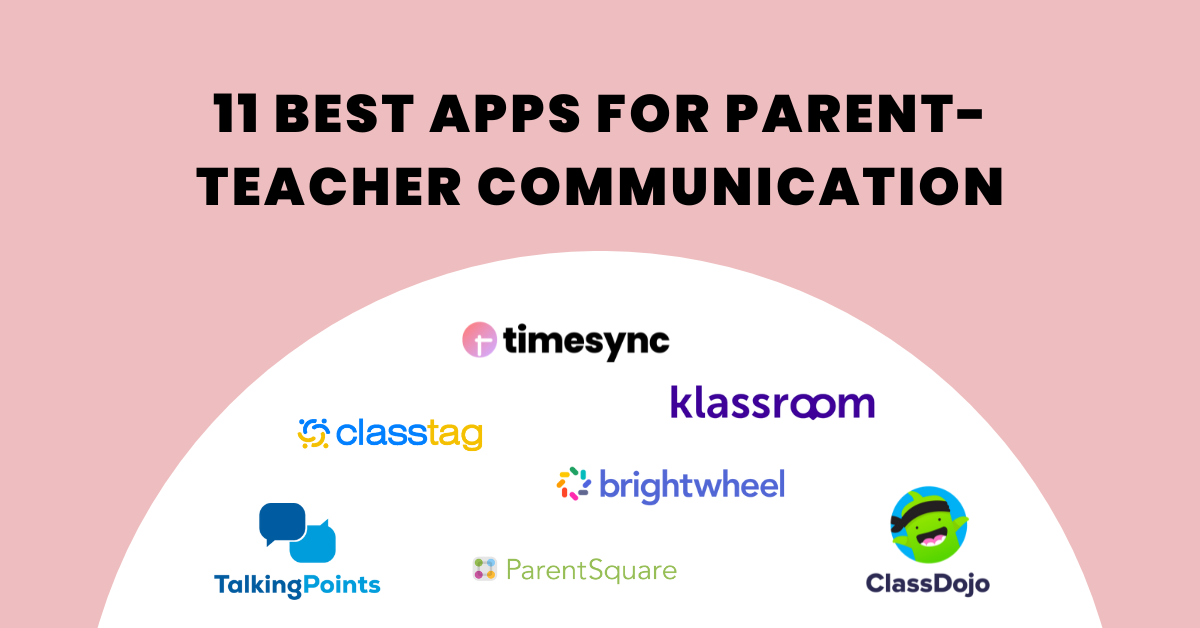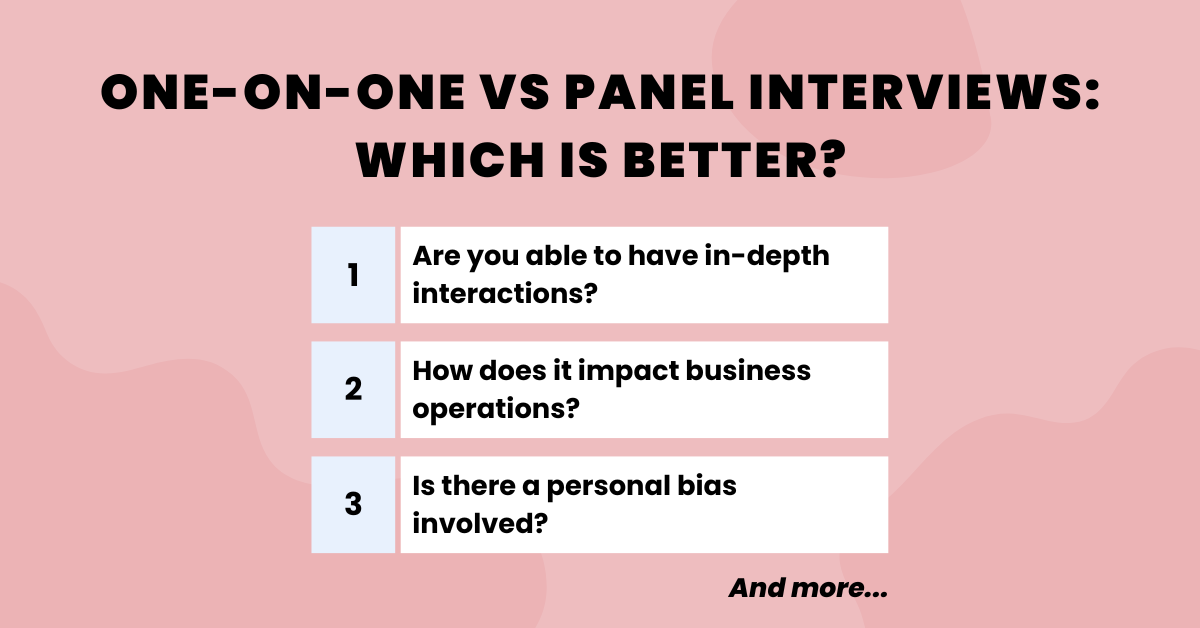

Menu



Content Writer
There are several interview types, and no format is right or wrong. Interview styles, strategies, and approaches vary depending on your business, job positions, and more.
That being said, interviewing potential new hires is still a crucial part of the hiring process.
If a candidate doesn’t work out, this means the opportunity cost (the wasted time and resources) involved in interviewing that person far outweighs the cost of the employee recruiting and training them.
That’s why we’ve written this article.
Both one-on-one and panel interviews have their pros and con — but to save you time, we’ve drawn a comparison between these two most popular interview formats to try and help you decide which one is best suited for your company.
Let’s get started!
One-on-one interviews are in-person or online interviews that involve one interviewer and one applicant.
A one-on-one interview is meant primarily to assess a candidate’s demeanor, behavioral qualities, and possible compatibility within a team and the firm.
If you are conducting a one-on-one interview, keep the format simple and straightforward. The main point of this interview style is to assess your candidate’s fit and get more personal with them.
Though the interviewer could be anyone, including the boss, the HR department, or a third-party recruitment consultant hired by the company, it’s always better if it’s done by someone who will be working closely with the candidate.
This way, the interviewer can better evaluate the candidate on their fit with the company and role. If the candidate is hired, the interviewer and the candidate will also be more comfortable with each other since they are already familiar with each other.
This interview style refers to a panel of two or more interviewers conducting the interviews. Typically, it’s done in a room with several key decision makers of the company — these interviewers make up the panel.
Each panelist will ask the candidate at least one question that could be about their resume, the company, or the industry.
The second kind of panel interview can involve more than one candidate. In this situation, the panelists would interview each of them separately which, if the panel wants, can also be carried out as a group discussion or debate.
With each passing day, panel interviews are becoming popular. Not only will it help you shortlist candidates faster, but will also give you a good idea of how each applicant behaves under pressure.
To help you decide which interview format you should go for when hiring a candidate for your company, we have drawn detailed comparisons between the two formats.
When you are in the process of hiring a candidate, it’s natural that you’d want to gather as much information about them as possible.
Only then you’ll be able to know if they are apt for the job while also figuring out if they fit the company culture. While their resumes do include their technical skills and experience, interviews are the best approach to truly know a candidate’s capabilities.
Out of the two interview formats, 1-on-1 interviews are definitely better, primarily because it makes room for having detailed conversations about the candidate’s skills, experience, work ethics, goals, etc. Meanwhile, the candidate can also ask questions to clear any doubts they have.
On the other hand, in panel interviews, wherein one candidate is interviewed by several panelists, it becomes difficult to stick to one panelist’s question for long and makes it impossible to have in-depth conversations. It also leads to a lot of repetition and unanswered questions.
💡Which is better: One-on-one Interviews
Conducting longer interviews is not only exhausting but can also affect your company’s day to day business productivity. While selecting the best candidate from the application pool is crucial, it shouldn’t clash with other important activities.
When it comes to one-on-one interviews, scheduling one is pretty easy. Since you’ll only need only one interviewer, this can be easier to arrange and conduct.
On the contrary, organizing panel interviews are more difficult since you’d have to find a common time and place to gather all the members as well as interviewees. Since a panel interview requires members from various departments of the company, it may have an effect on its day-to-day operations.
However, panel interviews are still better because of the fact that it saves a ton of time shortlisting candidates.
For instance, if you have 10 candidates lined up, interviewing all of them one by one sounds like a nightmare. Whereas, if there are several members, you can take a break and let others guide the interview.
💡Which is better: Panel Interviews
More often than not, even a potentially fit candidate can lose their chance of getting hired due to the personal bias of the interviewer and their questions related to it. This is also known as a “hiring bias”.
Herein, the interviewer decides on prospects based only on initial impressions (resume, profile picture, educational background, etc).
Personal bias is a very common occurrence in one-on-one interviews. Since there’s only one interviewer, they have control over the types of questions to ask and the direction in which to steer the interview. In these cases, the interviewer’s personal bias often comes in between the process.
The problem here is that the questions put up by the interviewer can be based on proving his prejudices right and it’s very likely that your company may end up losing a good candidate.
Contrary to this, panel interviews have members from different departments and expertise, etc. This can automatically reduce any hiring biases as there can be different opinions on a single candidate.
💡Which is better: Panel Interviews
As the interviewer, it is your responsibility to ensure that the individuals being interviewed are at ease during the process. Only then would they be able to perform their best.
One of the major pros of one-on-one interviews is that a well-trained interviewer can easily make the interview ambience more relaxed for the candidate. This way, not only will the candidate answer questions better, but will also feel comfortable to share their opinions, questions, and doubts about the company.
Meanwhile, panel interviews are known to be stressful. Candidates may feel a status gap if they are required to face a large number of interviewers who are all of a higher position than their respective occupations.
As a consequence, most candidates will feel anxious and might not be able to display their real competence.
💡Which is better: One-on-one Interviews
A major drawback of one-on-one interviews is that the format can get boring and repetitive. Moreover, they can easily be rehearsed which in turn won’t be effective in assessing the real capability of a candidate.
On the contrary, a panel interview is the best way to assess a candidate. Hailing from different work backgrounds and expertise, each panelist will have a set of diverse questions targeting different aspects of the candidate’s skills and understanding.
While one-on-one interviews may be more in-depth, it only focuses on a limited aspect of a candidate’s personality. As a result, panel interviews are a superior approach to assess the candidate better before hiring them.
💡Which is better: Panel interviews
It’s a no-brainer that to have a productive interview, you’ll need a professional who knows what they’re doing.
In a one-on-one interview, it is an absolute must that whoever is interviewing the candidates should be highly trained. This is because the responsibility of having a good fruitful discussion lies more on the interviewer than on the interviewee.
If you don’t have these resources, one-on-ones might not be the best option.
Rather, you’d want to turn your head towards panel interviews because even if you have a new, inexperienced interviewer, you can group them up with other experienced panelists. This way, they can observe and learn how to conduct interviews and the types of questions that should be asked.
💡Which is better: Panel Interviews
Conducting panel interviews has a number of advantages, one of the most significant of which is the fact that it accurately reflects the culture of a company behind the scenes.
When a candidate is interviewed by managers and department heads from all over the organization, it indirectly provides them with a window into the inner workings of the company.
As a result, if and when they are hired, they are already familiar with the staff and thus have much clarity navigating their work.
However, since there is only an interviewer in a one-on-one interview, there is very little amount of information shared with the candidate.
💡Which is better: Panel Interviews
As mentioned, there is no perfect way to interview potential employees. However, one-on-one and panel interviews are some of the most common methods used by organizations around the world.
Based on the factors discussed above, panel interviews do look like a better option. But at the end of the day, it all depends on how you carry your business. If you’re mass hiring, panel interviews with multiple candidates might be the ideal option as you can assess multiple candidates at one go.
However, if you’d prefer a more personal session to fully understand your candidate’s fit, one-on-one interviews would be a better choice.
But, no matter the type of interview you decide to use, you as the interviewer should make sure that you’re well organized and prepared to conduct the interview. This will allow you to properly evaluate your candidates and make the right choice for the company.

Devesh is a content writer at Novocall.
Related articles
Subscribe to our blog
Get insights & actionable advice read by thousands of professionals every week.